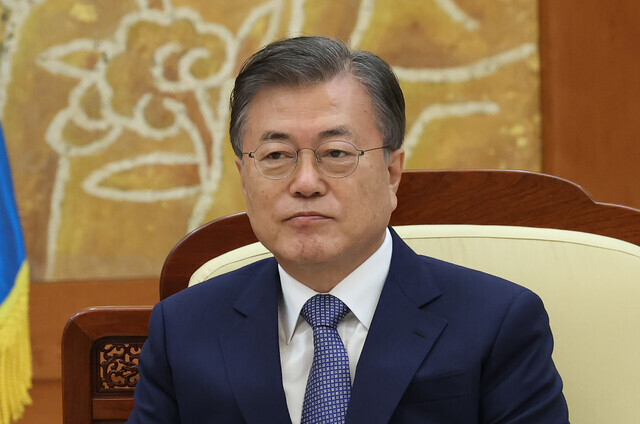hankyoreh
Links to other country sites 다른 나라 사이트 링크
[Editorial] Suga should respond to Moon’s call for cooperation and dialogue

In a congratulatory letter to Yoshihide Suga, who became Japanese Prime Minister on Sept. 16, South Korean President Moon Jae-in expressed his hope that their two countries would “continue working together to further develop their relationship during Suga’s time as prime minister,” according to Blue House Spokesperson Kang Min-seok. That expresses Moon’s determination to take Suga’s inauguration as an opportunity to improve South Korea’s relations with Japan, which worsened during the tenure of Suga’s predecessor, former Prime Minister Shinzo Abe.
“Our Japanese friends not only share our fundamental values and strategic interests but are also closest to us geographically and culturally. President Moon is ready to sit down with the Japanese government at any time for dialogue and communication, and we hope that the Japanese will be eager to engage,” Kang went on to say. By strongly expressing closeness and cordiality for Japan, Moon emphasized his determination to use dialogue to clear up outstanding issues affecting the two countries.
South Korea-Japan relations reached a historical nadir after the Abe administration retaliated against a decision by the South Korean Supreme Court — in which the court ordered Japanese companies to compensate the victims of forced labor during Japan’s colonial rule over Korea — by tightening controls on exports of key materials. It’s significant that Moon used his congratulatory letter to Suga to propose working together to improve the two countries’ relationship, which became strained during Abe’s premiership.
Now it’s time for Japan to respond. The cabinet that Suga announced on Sept. 16 retains all the key officials who served under Abe, earning Suga the moniker of “Abe 2.0,” so the fact is that change doesn’t seem likely. Suga, second-in-command under Abe, has stressed that he’ll uphold the policies of the Abe administration. Furthermore, Suga has long agreed with Abe’s argument that compensation for victims of forced labor was completely resolved by the two countries’ 1965 agreement settling outstanding claims and that victims’ demand for compensation represents a “violation of international law.” Suga also played a key role in South Korea and Japan’s conclusion of the comfort women agreement on Dec. 28, 2015.
But Suga also has a pragmatic side that led him to distance himself from the historical revisionism to which Abe clung so tenaciously. Suga was also opposed to Abe paying his respects at the controversial Yasukuni Shrine. We hope that Suga will demonstrate a pragmatic style of leadership by eagerly accepting the proposal for improving relations that Moon made so emphatically in the letter he sent on Suga’s inauguration day.
If South Korea, China, and Japan hold a trilateral summit in Korea this year, as planned, paving the way for Moon and Suga’s first summit, the two leaders could enable major change, given sufficient resolve. Neither country can afford to let their bilateral relations remain in their current state any longer. Bilateral cooperation on the international uncertainty caused by the New Cold War between the US and China and on the COVID-19 pandemic and the resulting economic crisis would be a boon for both South Koreans and Japanese. We hope that both countries will create space for diplomacy and spare no pains in making the most of this opportunity.
Please direct comments or questions to [english@hani.co.kr]

Editorial・opinion
![[Column] The state is back — but is it in business? [Column] The state is back — but is it in business?](https://flexible.img.hani.co.kr/flexible/normal/500/300/imgdb/original/2024/0506/8217149564092725.jpg) [Column] The state is back — but is it in business?
[Column] The state is back — but is it in business?![[Column] Life on our Trisolaris [Column] Life on our Trisolaris](https://flexible.img.hani.co.kr/flexible/normal/500/300/imgdb/original/2024/0505/4817148682278544.jpg) [Column] Life on our Trisolaris
[Column] Life on our Trisolaris- [Editorial] Penalties for airing allegations against Korea’s first lady endanger free press
- [Editorial] Yoon must halt procurement of SM-3 interceptor missiles
- [Guest essay] Maybe Korea’s rapid population decline is an opportunity, not a crisis
- [Column] Can Yoon steer diplomacy with Russia, China back on track?
- [Column] Season 2 of special prosecutor probe may be coming to Korea soon
- [Column] Park Geun-hye déjà vu in Yoon Suk-yeol
- [Editorial] New weight of N. Korea’s nuclear threats makes dialogue all the more urgent
- [Guest essay] The real reason Korea’s new right wants to dub Rhee a founding father
Most viewed articles
- 1Amid US-China clash, Korea must remember its failures in the 19th century, advises scholar
- 2[Column] The state is back — but is it in business?
- 360% of young Koreans see no need to have kids after marriage
- 4New sex-ed guidelines forbid teaching about homosexuality
- 5Trump’s talk of flouting NATO promises sparks apprehension in Seoul
- 6[Column] Why Korea’s hard right is fated to lose
- 7[Guest essay] Maybe Korea’s rapid population decline is an opportunity, not a crisis
- 8[Reporter’s notebook] In Min’s world, she’s the artist — and NewJeans is her art
- 9Presidential office warns of veto in response to opposition passing special counsel probe act
- 10[Column] Life on our Trisolaris